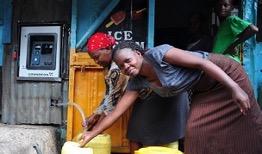Water ATMs: How Technology is Improving Water Governance in Tanzania
Originially posted on NextBillion.net
https://www.crs.org/our-work-overseas/ict4d
When you hear the term water governance, what comes to mind? Politicians? Hygiene? A community water tap? Would you believe that 783 million people do not have access to safe water?  A huge reason for this is – you guessed it – bad water governance.
According to the Organization for Economic Cooperation and Development (OECD), water governance is “the set of rules, practices, and processes through which decisions for the management of water resources and services are taken and implemented, and decision-makers are held accountable.â€
So what does this mean? The lack of accessible, potable water for many of the world’s most remote communities is too often due to a governance issue. In Tanzania, for example, this issue is two-fold: Many water points aren’t functional and the collection of revenue from community water systems is often mismanaged. Maintenance and upkeep of public wells or faucets requires proper management, and a water authority needs a steady source of income to pay for the upkeep. When the water tap is functioning, it needs to be monitored for future complications and managerial projects. Catholic Relief Services (CRS), Grundfos LIFELINK A/S, and the Diocese of Mbulu Development Department (DMDD) have teamed up to solve Tanzania’s water governance issue with an innovative solution. This solution is an ATM for water, or a prepaid water system that self-manages accounts, revenue collection and water data.
HOW DOES A WATER ATM WORK?
Grundfos is a Danish water technology and borehole/well pump innovator. CRS’ Revolutionizing Remittance Recovery in Water (R3W) Project in Tanzania is implementing Grundfos’ AQTaps, or “water ATMs,†in rural and peri-urban communities for families to gain access to safe drinking water. The AQTaps accept smart cards, a form of mobile money, allowing people to use the water dispenser. These smart cards are similar to a reusable gift card where money is put in the AQTap account by visiting a local water vendor or through a mobile money transfer system compatible with a simple mobile phone. This way any time the smart card runs out of money, families can easily replenish water credit. Once the smart card holds sufficient funds, it can be swiped at the nearby AQTap system. When an AQTap smart card is swiped, an online database instantly collects the revenue and transaction data. The AQTap is hooked up to a clean water tank, which obtains potable water from solar-powered boreholes funded by CRS. This water flows to the AQTap dispenser unit and pours into the user’s water container after they swipe their smart card and choose an amount of water to be dispensed. The money collected will ensure that repairs will be made and the system will continue to function once the CRS partnership ends.
The above video is a compilation on LifeLink water solutions from Grundfos Pumps Corporation.
This past May, CRS was able to install 20 water dispensers to be used at AQTap water kiosks in the Karatu District of Tanzania, one of seven districts in the northern Arusha region. The price for water is around 25 Tanzanian shillings (about 1 US cent) for every 20 liters (or 5.3 gallons) of water dispensed. At this low price, CRS promotes WASH (water, sanitation and hygiene) inclusion for even the most impoverished communities.
The completion of the water ATMs led to a presentation of the R3W project at an Arusha Regional WASH sector meeting in hopes of expanding the service to other districts in the region. The promotion of these prepaid water meters continued at a meeting with the high-level Karatu District Council staff, including a member of parliament, the district executive director, district commissioner and a council chair. The council staff ensured their support for the water project and committed to the provision of safe, sustainable drinking water for local people. The R3W project will not only solve the issue of malfunctioning water taps, but will provide valuable data for future decision-making in the WASH sector of Tanzania.
A SUSTAINABLE BUSINESS MODEL
The reliability of the prepaid water meter system is due to its underlying sustainable business model. By tracking all transactions and revenue intake, the AQTap water kiosk solves the problem of revenue collection mismanagement and provides transparency. This type of transparency is key for sustainable and effective water governance. Furthermore, the water management database alerts technicians when a pump has stopped or a dispenser has ceased working due to an interruption of transaction data. This instant update capability mitigates the effect of any damages to the kiosk or dispenser. The management database will also allow for proper decision-making, as authorities will always know how much water is being withdrawn and how frequently, how much revenue they are making, and additional useful information. The sustainable business model includes other local actors, providing employment to villagers involved, such as local engineers trained to fix parts of the borehole or kiosk in case of breakdowns. For those living in remote areas without the option of mobile banking, local money vendors must be used to replenish credit onto the smart card to pay for the AQTap water.
One question for the social sector is: How do we acquire more systems like the AQTap for managing resources and necessities such as food, education and infrastructure in the developing world? Water governance is not the only governance issue facing developing countries. Without proper leadership and just authority, impoverished areas lack the opportunity to progress. If we can establish and maintain information and communication technology tools that administer resources with sustainable and just transparency, we can eliminate inefficiencies of governance mismanagement and infrastructure breakdowns and build capacity that encourages these areas to progress.
Madison Lawson is an ICT4D Training and Communications assistant at Catholic Relief Services.
